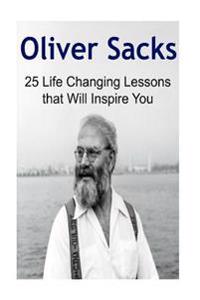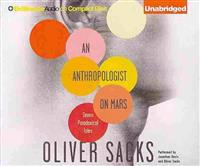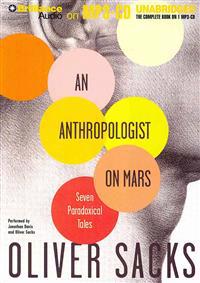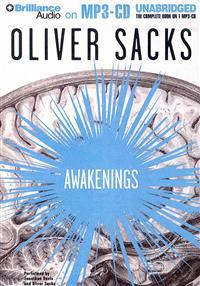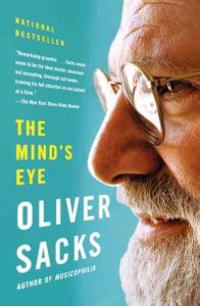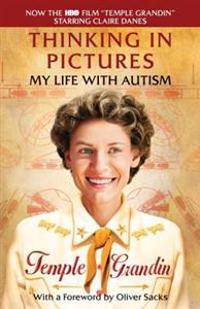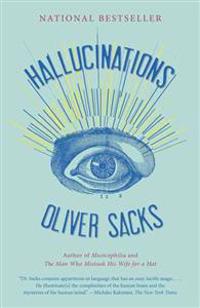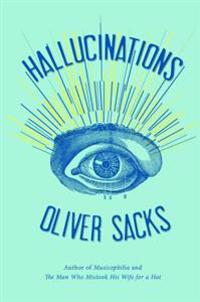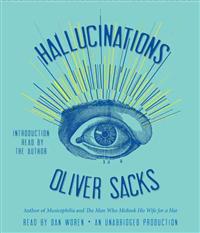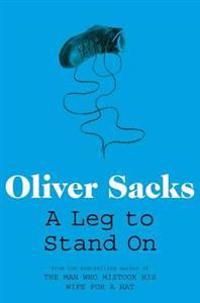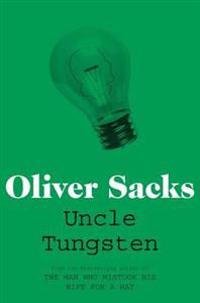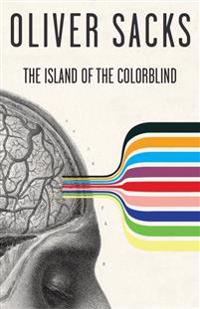Oliver Sacks: 25 Life Changing Lessons That Will Inspire You: Oliver Sacks, Oliver Sacks Book, Oliver Sacks Tips, Oliver Sacks Lesso (häftad)
ISBN: 9781517783723 - UTGIVEN: 2015-10Oliver Sacks: 150 Life Transforming Lessons That Will Inspire You: Oliver Sacks, Oliver Sacks Book, Oliver Sacks Info, Oliver Sacks (häftad)
ISBN: 9781523295920 - UTGIVEN: 2016-01A Leg to Stand on (Pocket)
avSacks, Oliver W
ISBN: 9780684853956Dr. Oliver Sacks's books "Awakenings, An Anthropologist on Mars" and the bestselling "The Man Who Mistook His Wife For a Hat" have been acclaimed for their extraordinary compassion in the treatment of patients affected with profound disorders. In "A Leg to Stand On, " it is Sacks himself who is the[...]
Musikofilia. Tarinoita musiikista ja aivoista (Inbunden)
avSacks Oliver
ISBN: 9789525516050 - UTGIVEN: 200901Oliver Sacks, jota New York Times on kutsunut lääketieteen hovirunoilijaksi, tarkastelee Musikofiliassa musiikin sijaintia aivoissa ja sen vaikutusta ihmiseen. Hän tutkii musiikin voimaa myötätuntoiseen ja lukeneeseen tyyliinsä potilaiden, muusikkojen ja tavallisten ihmisten kokemusten kautta.[...]
An Anthropologist on Mars: Seven Paradoxical Tales (CD-bok)
avOliver Sacks, Jonathan Davis, Oliver Sacks
ISBN: 9781480530362 - UTGIVEN: 201306To these seven narratives of neurological disorder, Dr. Sacks brings the same humanity, poetic observation, and infectious sense of wonder that are apparent in his best sellers Awakenings and The Man Who Mistook His Wife for a Hat. These men, women, and one extraordinary child emerge as brilliantly [...]
An Anthropologist on Mars: Seven Paradoxical Tales (CD-bok)
avOliver Sacks, Jonathan Davis, Oliver Sacks
ISBN: 9781480530386 - UTGIVEN: 2013-06To these seven narratives of neurological disorder, Dr. Sacks brings the same humanity, poetic observation, and infectious sense of wonder that are apparent in his best sellers Awakenings and The Man Who Mistook His Wife for a Hat. These men, women, and one extraordinary child emerge as brilliantly [...]
An Anthropologist on Mars: Seven Paradoxical Tales (Övrigt)
avOliver Sacks, Jonathan Davis, Oliver Sacks
ISBN: 9781480530409 - UTGIVEN: 201306To these seven narratives of neurological disorder, Dr. Sacks brings the same humanity, poetic observation, and infectious sense of wonder that are apparent in his best sellers Awakenings and The Man Who Mistook His Wife for a Hat. These men, women, and one extraordinary child emerge as brilliantly [...]
Awakenings (Övrigt)
avOliver Sacks, Jonathan Davis, Oliver Sacks
ISBN: 9781480530416 - UTGIVEN: 2013-06?Compulsively readable. . . . Dr. Sacks writes beautifully and with exceptional subtlety and penetration into both the state of mind of his patients and the nature of illness generally. . . . A brilliant and humane book.? ? A. Alvarez, The Observer Awakenings ? which inspired the major motion pictur[...]
Awakenings (Övrigt)
avOliver W. Sacks, Jonathan Davis, Oliver W. Sacks
ISBN: 9781480530430 - UTGIVEN: 2013-06?Compulsively readable. . . . Dr. Sacks writes beautifully and with exceptional subtlety and penetration into both the state of mind of his patients and the nature of illness generally. . . . A brilliant and humane book.? ? A. Alvarez, The Observer Awakenings ? which inspired the major motion pictur[...]
Thinking in Pictures: And Other Reports from My Life with Autism (Häftad)
avTemple Grandin, Oliver Sacks
ISBN: 9780307275653 - UTGIVEN: 200601In this unprecedented book, a gifted animal scientist who is also autistic, delivers a report on autism, written from her unique perspective. What emerges is the document of an extraordinary human being, one who bridges the gulf between her condition and our own, shedding light on the riddle of our [...]
The Mind's Eye (Häftad)
avOliver W. Sacks
ISBN: 9780307473028 - UTGIVEN: 201110With compassion and insight, Dr. Oliver Sacks again illuminates the mysteries of the brain by introducing us to some remarkable characters, including Pat, who remains a vivacious communicator despite the stroke that deprives her of speech, and Howard, a novelist who loses the ability to read. Sacks [...]
Thinking in Pictures: And Other Reports from My Life with Autism (Häftad)
avTemple Grandin, Oliver Sacks
ISBN: 9780307739582 - UTGIVEN: 201001Hallucinations (Häftad)
avOliver Sacks
ISBN: 9780307947437 - UTGIVEN: 201307Have you ever seen something that wasn't really there? Heard someone call your name in an empty house? Sensed someone following you and turned around to find nothing? Hallucinations don't belong wholly to the insane. Much more commonly, they are linked to sensory deprivation, intoxication, illness, [...]
Hallucinations (Inbunden)
avOliver W. Sacks
ISBN: 9780307957245 - UTGIVEN: 201211From the best-selling author of Musicophilia and The Man Who Mistook His Wife for a Hat, a provocative investigation into hallucinations-auditory, visual, tactile, olfactory-their many guises, their physiological sources, and their personal and cultural resonances. Hallucinations, for most people, i[...]
Hallucinations (CD-bok)
avOliver W. Sacks
ISBN: 9780307967329 - UTGIVEN: 2012-11Have you ever seen something that wasn't really there? Heard someone call your name in an empty house? Sensed someone following you and turned around to find nothing?
Hallucinations don't belong wholly to the insane. Much more commonly, they are linked to sensory deprivation, intoxication, illn[...]A Leg to Stand on (Storpocket)
avOliver Sacks
ISBN: 9780330507622 - UTGIVEN: 201207'Oliver Sacks is a perfect antidote to the anaesthetic of familiarity. His writing turns brains and minds transparent' Observer When Oliver Sacks, a physician by profession, injured his leg while climbing a mountain, he found himself in an unusual position -- that of patient. The injury itself was s[...]
The Mind's Eye (Pocket)
avOliver Sacks
ISBN: 9780330508902 - UTGIVEN: 201109"Oliver Sacks is a perfect antidote to the anaesthetic of familiarity. His writing turns brains and minds transparent". ("Observer). In "The Mind's Eye", Oliver Sacks tells the stories of people who are able to navigate the world and communicate with others despite losing what many of us consider in[...]
The Mind's Eye (Häftad)
avOliver Sacks
ISBN: 9780330513999 - UTGIVEN: 2010-10-01In "Musicophilia", Oliver Sacks explored music and the brain; now, in "The Mind's Eye", he writes about the myriad ways in which we experience the visual world: how we see in three dimensions; how we recognize individual faces or places; how we use language to communicate verbally; how we translate [...]
Musicophilia (Storpocket)
avOliver Sacks
ISBN: 9780330523592 - UTGIVEN: 201109'A humane discourse on the fragility of our minds, of the bodies that give rise to them, and of the world they create for us. This book is filled with wonders' Daily Telegraph Oliver Sacks' compassionate tales of people struggling to adapt to different neurological conditions have fundamentally chan[...]
An Anthropologist on Mars (Storpocket)
avOliver Sacks
ISBN: 9780330523608 - UTGIVEN: 201205'An inexhaustible tourist at the farther reaches of the mind, Sacks presents, in sparse, unsentimental prose, the stories of seven of his patients. The result is as rich, vivid and compelling as any collection of short fictional stories' Independent on Sunday As with his previous bestseller, The Man[...]
The Man Who Mistook His Wife for a Hat (Storpocket)
avOliver Sacks
ISBN: 9780330523622 - UTGIVEN: 201109"Oliver Sacks has become the world's best-known neurologist. His case studies of broken minds offer brilliant insight into the mysteries of consciousness". ("Guardian"). In his most extraordinary book, Oliver Sacks recounts the stories of patients lost in the bizarre, apparently inescapable world of[...]
Seeing Voices (Storpocket)
avOliver Sacks
ISBN: 9780330523646 - UTGIVEN: 201207'Seeing Voices is both a history of the deaf and an account of the development of an extraordinary and expressive language' Evening Standard Imaginative and insightful, Seeing Voices offers a way into a world that is, for many people, alien and unfamiliar -- for to be profoundly deaf is not just to [...]
Uncle Tungsten (Storpocket)
avOliver Sacks
ISBN: 9780330523660 - UTGIVEN: 201205'If you did not think that gallium and iridium could move you, this superb book will change your mind' The Times In Uncle Tungsten Sacks evokes, with warmth and wit, his upbringing in wartime England. He tells of the large science-steeped family who fostered his early fascination with chemistry. The[...]
The Island of the Colorblind (Häftad)
avOliver W. Sacks
ISBN: 9780375700736 - UTGIVEN: 199801"An explorer of that most wondrous of islands, the human brain," writes D.M. Thomas in "The New York Times Book Review," "Oliver Sacks also loves the oceanic kind of islands." Both kinds figure movingly in this book--part travelogue, part autobiography, part medical mystery story--in which Sacks's j[...]

